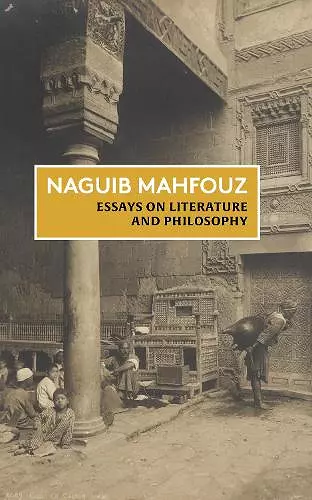Essays on Literature and Philosophy
The Non-Fiction of Naguib Mahfouz: Volume I
Naguib Mahfouz author Rasheed El-Enany author Aran Byrne translator Rasheed El-Enany editor
Format:Paperback
Publisher:GINGKO
Published:18th Sep '25
Should be back in stock very soon

The first writer in Arabic to win the Nobel Prize for Literature, Naguib Mahfouz’s novels helped bring Arabic literature to an international readership. This collection of his early writing, from his time as a student of philosophy, reveals the intellectual ferment of the young author, grappling with two millennia of philosophers and writers and establishing his own voice among them.
Available in English for the first time, these essays tackle a vast array of subjects, from Presocratic Philosophy to love and the sexual impulse. The intellectual development demonstrated here forms the foundation of Mahfouz’s literary work, granting insight into the mind behind such famed work as the Cairo Trilogy, and Children of The Alley.
‘At this time in the 21st century when reactionary and fundamentalist religious currents are forcefully asserting themselves wherever one looks, it is wonderful to read these essays on art and culture, on love, on democracy, on Umm Kulthum, on Philosophy, on psychology, written when the Arab world’s only Nobel Laureate in Literature was a young man, and showing that the humanity and depth of his literary oeuvre was part and parcel of his tolerant, open-minded and secularist world view.’
-- Margaret Obank"Mahfouz embodied the essence of what makes the bruising, raucous, chaotic human anthill of Cairo possible."
* Economist *Mahfouz has been associated in the western imagination as his country's great cosmopolitan secularist, a quiet critic of patriarchy and a reasoned voice against the gathering forces of Islamist revivalism. . . . Western readers have historically only had the novels to go by, in situating Mahfouz in the context of Egypt's mid-century transformations. It is only with the English publication of On Literature and Philosophy, the first volume of Mahfouz's non-fiction writing, that there is a body of journalism and essays through which to trace Mahfouz's intellectual journey.
* Financial Times *These essays . . . give fascinating context to a great novelist's oeuvre, while also shedding light on the interests of literate Egyptians in the early 1930s.
-- Marcia Lynx Qualey"Perhaps best known as a novelist, Egyptian Nobel laureate Naguib Mahfouz was a prolific commentator on extraliterary issues, both national and international. On Literature and Philosophy: The Non-Fiction Writing of Naguib Mahfouz collects, for the first time in English translation, a representative selection of his early essays on topics ranging from philosophy in the pre-Socratic era to artistic imagery in the Koran. . . . The anthology provides important insights into mid-twentieth-century currents of thought that informed the acclaimed author's subsequent novels. Dating in large part to the 1930s and 1940s, the essays highlight the consequential influence of European philosophy on the evolution of Arabic intellectual history. According to El-Enany, if Mahfuz "had not been a great novelist, he would have been a great teacher.". . . Recommended."
"The books offer a fascinating insight into how the writer processed and responded to the sometimes-tumultuous events his country faced during these times."
ISBN: 9781914983351
Dimensions: 216mm x 135mm x 12mm
Weight: 250g
172 pages